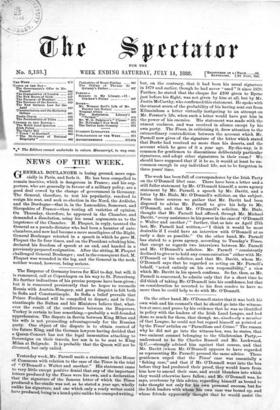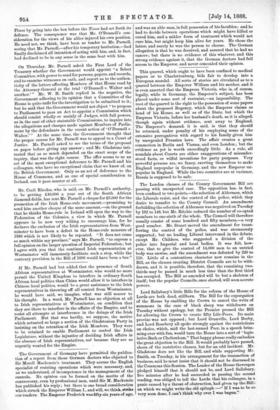On the other hand, Mr. O'Donnell states that it was
both his own wish and his counsel's that he should go into the witness- box at once, and prove by his evidence that he was so identified in policy with the leaders of the Irish Land League, and bad done so much for them, that though no,, abboltuely a member of that League, he could not but regard himself as pointed at by the Times' articles on " Parnellism and Crime." The reason why he did not go into the witness-box, was, he states, that two eminent counsel belonging to the Gladstonian Party,— understood to be Sir Charles Russell and Mr. Lockwood, Q.C.,—strongly advised him against that coarse, and that Mr. Davitt (whom Mr. O'Donnell appears to have regarded as representing Mr. Parnell) pressed the same advice. Those gentlemen urged that the Times' case was essentially a "fishing case," and that if Mr. O'Donnell went into the box before they had produced their proof, they would learn from him how to amend their case, and avoid blunders into which they would otherwise have fallen; and Mr. O'Donnell was, he says, overborne by this advice, regarding himself as bound to take thought not only for his own personal success, but for the Irish leaders with whom his own case was bound up, and whose friends apparently thought that he would assist the
Times by going into the box before the Times had set forth its defence. The consequence was that Mr. O'Donnell's con- sideration for the views of his allies injured his own position. He need not, we think, have, been so tender to Mr. Parnell, seeing that Mr. Parnell,—after his temporary hesitation,—had finally disclaimed all intention of acting with him, and, in fact, had declined to be in any sense in the same boat with him.



































